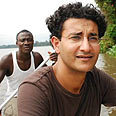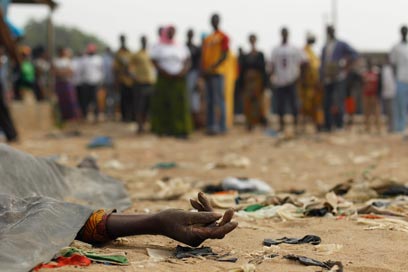
Cocktails or gunshots? Life of Israeli diplomat in Africa
Elad Ratson gave up a good job, risked his relationship in order to serve as deputy chief of Israel's mission in Ivory Coast. While bullets fly over his head, all he asks for is that State treats those who make great sacrifices with dignity
"Warnings and threats were published in the newspapers the day before the New Year, and the embassy staff had to entrench themselves at home. The political deadlock in the Ivory Coast has taken a heavy toll on human lives, and on several occasions we heard gunfire in remote neighborhoods. This time, unlike other instances, the gunshots were only a few hundred meters from my porch. While I ran inside to turn off the lights, I asked myself: 'What cocktails and soirees did they talk about when they tried to describe my life?'"
Elad Ratson, 36, a Foreign Ministry cadet who currently serves in Abidjan – the Ivory Coast's financial capital, decided to join the Israeli Foreign Service after experiencing it first hand.
"My first encounter with Israeli diplomacy was 11 years ago. Like many other young Israelis, I decided to travel across the African continent. I started my long trip in Morocco, and made my way south without any problems; reality changed when I entered Gambia," he recalled.
"As soon as I presented my Israeli passport to the border police I was marked as a threat and was transferred to the secret police headquarters in the capital of Banjul, where I was detained. I had very little knowledge that those days the only world leader that supported Gambia was Lybia's Qaddafi, who trained the military regime's soldiers and also brainwashed them on anything that had to do with Israel.
"After my arrest, I was allowed one phone call. Like many Israelis that are caught in these circumstances, I phoned the nearest Israeli embassy in Senegal and gave them my location and the accusations against me," he said.
After four days in detention, Ratson was surprised to see a respected looking man arrive at the secret police facility and demanding his release – in the name of the president of Gambia.
"While the locals were trying to figure everything out, the man entered my cell and told me that he was the representative of the Israeli ambassador to Senegal, the late Mr. Doron Grossman, and that he was responsible of promptly releasing me and transferring me back to Senegal.

Daily killing of civilians in Ivory Coast (Photo: AP)
Until this day I don’t know what position that man held," Ratson admits," But on the same day I was transferred to a nearby hotel and within two days I was a free man on the Senegalese side of the border," the diplomat noted.
Upon his return to Senegal, Ratson personally thanked Grossman, and was offered to stay and work at the embassy for a short while.
The experience at the embassy left a strong impression on Ratson. "I realized I found my calling – to be an Israeli diplomat and contribute as much as I can to building Israel's status around the world.
"The motive is the same motive that led me to enlist into combat military service in an elite unit, and the same motive that made me volunteer for officers' course – Zionism."
Ratson wanted to acquire as many professional and academic skills ahead of his future career, and moved to Canada where he completed his Bachelorette's degree in international relations, which he funded from his savings, scholarships, and his parents and family's support.
After completing his degree with honors, Ratson moved to Washington D.C. and interned at a political research institution.
'Lower pay than state average'
With the break of the 2nd Lebanon War, Ratson returned to Israel, and became the vice director of a successful company, while waiting to join the Foreign Ministry cadet course."In January 2008 the newspapers published an announcement that a cadets course was opening. A month after applying I received a letter summoning me to the first round of exams. 9 months and 4 rounds later I received a phone call telling me that my candidacy has been approved," Ratson noted.
"They told me to come to a seminar at the Foreign Ministry building in Jerusalem. I found myself in a convention hall, with other candidates and their relatives, facing a panel of ministry spokespersons who conveyed a clear message: The pay at the Foreign Ministry is lower than the state average.
"They showed us slide after slide with graphs showing the expected wages, pension calculations and alternative routes for partners that are forced to give up on their future careers. The audience was in shock," he recalled.
"A few got up and left, while others refused to believe the data and continued to ask the panel piercing questions," Ratson returned home and did some soul searching.
"The easiest thing to do was to give up. A few months earlier I met my girlfriend and I already had a good job, an apartment and a life that I loved. Was it the right thing to ask for such a sacrifice from my partner?," he wondered.
Ratson's patriotism prevailed: "I realized that just like me, the panel members faced the same dilemma themselves. I thought to myself, if everyone asks 'what do I get out if it,' then what is the prospect of the Israeli Foreign Service."
Once Ratson completed his course, he was offered a job as the deputy chief of mission at the Israeli embassy in Abidjan, the Ivory Coast.
"The move to Africa was not easy," he recalled, "It took us five months to find an apartment that would allow us to live a normal life; not something fancy, as the budget didn’t allow for it, but something that will keep the jungle outside.
"So we found an apartment, but not a job. My partner, who is a veterinarian, paid a heavy professional price. We were in a country where people hardly had access to medical care, let alone animals," he lamented.
Sense of mission
Despite the looming tension between Ratson and his girlfriend, his sense of mission helped him overcome personal hardships. "The Ivory Coast offers a huge economic potential for the Israeli market. As soon as I got there I was busy arranging delegations of Israeli companies."The local press was bombarded with initiated articles about Israel's technological capabilities, and the delegation members enjoyed huge popularity among the local business community," he said, adding, "A number of multi-million dollar deals were signed, and it is hard to describe in words the sense of satisfaction you get, knowing that your work personally contributed to the financial vigor of Israeli companies."
However, reality changed again. The crisis that has been growing since the country's election last October brought the country to the verge of a civil war and changed the rules of the game. "For the past two months our reality has become quite grim," Ratson noted.
"All the diplomats' partners were evacuated from the country for fear of their lives, and visiting is out of the question. The delegates are besieged together, sleeping in hallways and sharing beds, while witnessing daily shootouts and killing of civilians," he said.
"The embassy's economic activity has reached an almost complete standstill, and our focus now is on securing the small community of Israelis that is left in the country," he explained.
Elad has not seen his partner since the situation escalated. "If the relative calm continues, I might be able to meet her in the neighboring Ghana for a few days. It is safe out there and it’s a short trip back, in case I have to return immediately," he added.
As part of the Foreign Ministry employees' struggle to improve their employment conditions, Ratson said he expects the state to treat those who make great sacrifices with dignity.
"I am an Israeli diplomat serving in a failed state. I live apart from my partner due to the risks involved. My life is not comfortable to say the least, and like many other Foreign Ministry employees, I do so out of choice, not because of the glory and definitely not because of the salary.
"I see my job as a mission and I am hopeful that one day in the near future the State of Israel will pay respect to those who sacrifice so much for it," he concluded.
- Follow Ynetnews on Facebook










